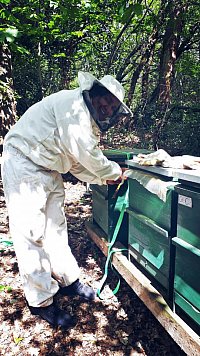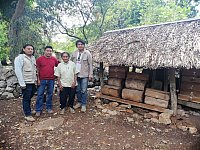Fernando Fleites-Ayil

Halle, Germany.
Contact
Allgemeine Zoologie
room 6.05
Hoher Weg 8
06120 Halle Halle (Saale)
phone: +49 (0)345 55 26507
fernando.fleitesa-ayil@student.uni-halle.de
postal address:
PhD Student Fernando Fleites
06120 Halle (Saale)
Research interest:
- Pathogen host interaction.
- Conservation biology and genetics.
- Ecology of social and solitary insects (focus on bees).
- Behavior of social insects.
- Social evolution.
- Pollination services of eusocial and solitary bees from tropics.
Current research:
My PhD research is focus on pathogen spill over among managed Africanized Honey Bees (AHBs) and native stingless bees from Yucatan Peninsula, Mexico.
The Yucatan Peninsula is considered an important apicultural region in Mexico because of the production of honey and other products from Africanized (Western) honey bees (Quezada- Euán et al ., 1996). Additionally, this tropical region has 17 different species of eusocial stingless bee (Ayala, 1999), which contribute to the pollination of flowering wild and crop plants. These bee species include the culturally, biologically and economically important Melipona beecheii , a stingless bee species managed by ancient peninsular Maya people up to the present day (González- Acereto, 2012). Populations of stingless bees in the tropics have nowadays been reported to be decreasing;Causes of decline include loss of habitat, agriculture intensification, exotic invasive species and their pathogens (Freitas et al ., 2009). Interactions between co- occurring stingless bees and honey bees at flowers or at hives could lead to the spread of RNA viruses among stingless bees, as has been observed between managed and wild bee species in other regions of the world (Fürst et al ., 2014 ; McMahon et al ., 2015).For this reason, identification of RNA viruses and evaluation of their possible negative effects on stingless bees, the focus of this research, is a priority in order to develop actions to conserve this culturally and economically important taxonomic group, as well as to maintain the ecosystem service of pollination in tropical regions.
Publications:
Onset of foraging and lifespan of Africanized honey bees ( Apis mellifera ) infected with different levels of Nosema ceranae spores in Neotropical Mexico. (2018). Fernando A. Fleites- Ayil, José Javier G. Quezada- Euán, Luis A. Medina Medina. https: // doi. org / 10 1007 / s13592- 018- 0602- 2
Developmental stability, age at onset of foraging and longevity of Africanized honey bees ( Apis mellifera L.) under heat stress (Hymenoptera: Apidae). (2018). Rubén G. Medina, Robert J. Paxton, EfraínDe Luna, Fernando A. Fleites- Ayil, Luis A. Medina Medina, José Javier G. Quezada- Euán. https: // doi. org / 10. 1016 / j. jtherbio. 2018. 04. 003
Professional career:
2017- 2018 Universidad Autónoma de Yucatán Campus de Ciencias Biológicas y Agropecuarias Tropical Beekeeping department. Laboratory and field technician “Climate change and pollinators: effect of thermal increase on developmental stability and indicators of biological aptitude in tropical bees in Mexico” Dr. José Javier G. Quezada Euán.
2015- 2017 Universidad Autónoma de Yucatán Campus de Ciencias Biológicas y Agropecuarias Tropical Beekeeping department. Research assistant, Scholarship- CONACYT, Mexico “Climate change and pollinators: effect of thermal increase on developmental stability and indicators of biological aptitude in tropical bees in Mexico” Dr. Jose Javier G. Quezada Euan
2012- 2013. Universidad Autónoma de Yucatán Departamento de Apicultura Tropical. Laboratory and field technician “Determination and quantification of soybean pollen grains and their bee behavior relationship in areas of crops near apiaries in the Yucatan peninsula” Dr. Luis A. Medina Medina and Dr. José Javier G. Quezada- Euán.
2010- 2012 Centro de Investigación Científica de Yucatán (CICY). Laboratory and field technician , “Conservación ex situ y fortalecimiento del uso de las plantas medicinales yucatecas” Dra. Martha Méndez.
Degrees.
2013- 2015 Master of agricultural science at Universidad Autónoma de Yucatán Campus de Ciencias Biológicas y Agropecuarias, Yucatán México.
2005- 2010 Bachelor Biology at Instituto de Tecnlógico Conkal, Yucatán México.

Meliponario Quintana Roo, Mexico.





